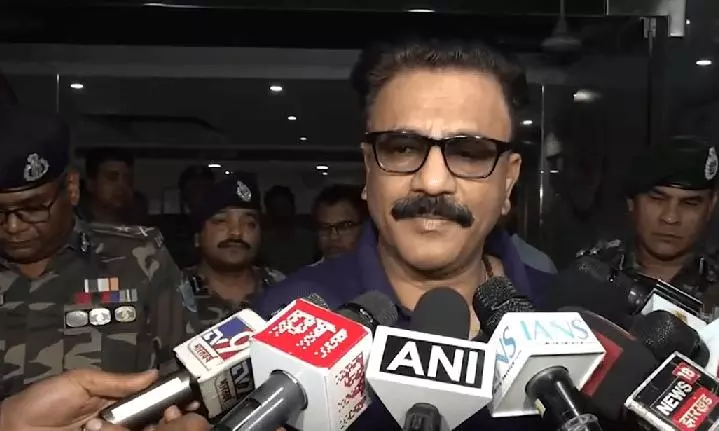
Will Anurag Gupta continue as Jharkhand DGP after April 30?
Appointed in a legally questionable way in February, the DGP turns 60 this month-end, but has been given a 2-year tenure by the Hemant Soren government

Can Jharkhand Director General of Police (DGP) Anurag Gupta continue to remain in service after April 30?
Gupta will turn 60 on April 26 and, per government rules, he shall retire from service on the afternoon of the last day of the month in which he turns 60.
But in a legally questionable move, the Hemant Soren government in Jharkhand, in February this year, appointed Gupta as the regular DGP of the state without involving the Union Public Service Commission (UPSC) as mandated by the Supreme Court in the landmark Prakash Singh case. Per the latest appointment, Gupta’s tenure is for a duration of two years.
Also read: Hemant Soren takes oath alone: Is he now the decisive voice in Jharkhand politics and beyond?
The power to extend the service tenure of an All India Service, of which the Indian Police Service (IPS) is a part, lies with the Central government, with the Union Home Ministry being the concerned ministry supervising affairs of the department. Rules mandate that the state government can recommend extension in service of an IPS officer, but the order in this regard shall come from the Union Home Ministry.
Petitions in SC, HC
But the state government has given Gupta a fixed tenure of two years as the state DGP and the term of fixed tenure goes beyond April 30, which is his original date of superannuation. He is now slated to remain as the state DGP till the end of July 2026.
His appointment as regular DGP with a fixed tenure of two years has been challenged by BJP leader Babulal Marandi in the Supreme Court, terming it a contempt of the SC directions in the Prakash Singh case.
Marandi has mounted another legal challenge to the appointment in the Jharkhand High Court as well, alleging that the extension given to Gupta is illegal.
Hearings after superannuation
However, the Supreme Court will hear the contempt petition on May 6, while the Jharkhand High Court has listed the matter for hearing on June 16. Hence, in both cases, the hearing will come after April 30, the date of Gupta’s superannuation.
To insulate the police from political pressure, the Supreme Court in 2006 said the states will appoint their police chiefs from amongst the three senior-most police officers whose names were part of a panel of three officers prepared by the UPSC.
“Since both the hearings in the Supreme Court and Jharkhand High Court are after Gupta’s original date of retirement, I am planning to move court for their preponement. I will consult my lawyer to seek an urgent hearing of the matter before April 30. The court should decide about Gupta’s continuation beyond April 30,” said Marandi, president of the Jharkhand unit of the BJP.
Watch | Jharkhand: ‘Hemant Soren signals he is the boss’
What 2006 verdict says
To insulate the police from political pressure, the Supreme Court in 2006 had said that the states will appoint their police chiefs from amongst the three senior-most police officers whose names were part of a panel of three officers prepared by the UPSC.
The UPSC was asked to form a panel of three officers on the basis of length of service, good record, and range of experience of the officers in consideration for the top police job in states.
The apex court also ruled that once the officer was selected for the job, he or she should have a minimum tenure of at least two years, irrespective of his or her date of superannuation.
The states were supposed to send a list of eligible officers (to hold the post of DGP) to the UPSC at least three months before the date of retirement of the incumbent on the post of DGP.
Soren govt circumvents rules
But in the case of Gupta, the Jharkhand government seems to have adopted a piecemeal approach to follow the directions of the highest court of the country.
As per the Supreme Court directions, the state government decided to appoint Gupta for a tenure of two years, but his selection was not done involving the UPSC.
Also read: Jharkhand: JMM passes resolution rejecting CAA, UCC, NRC
Not only that, the state government notified its own norms for the appointment of the DGP, which created an entirely new method of appointment of the police chief of the state. Under the state government-mandated process, a committee headed by a former judge of a high court and consisting of five other members – the chief secretary and the principal secretary (home) of Jharkhand government, a former DGP of Jharkhand and members nominated by the UPSC as well Jharkhand Public Service Commission – shall suggest a panel of three to five officers for selection as the DGP of the state.
And the state government would pick one of the officers for the post and appoint him or her for a tenure of two years.
‘Process questionable’
“The notification to create a new process of DGP by the Jharkhand government itself is a questionable move,” said a police officer who spoke to The Federal on the condition of anonymity.
Also read: Jharkhand: How fiery Soren beat divisive tactics, stole BJP's thunder
“The Supreme Court has directed that all state governments and even the Central government shall keep in abeyance any legislation or rule to appoint a DGP which runs counter to the process laid down by it in the Prakash Singh case.
"The process adopted by the state government is not in conformity with the directions of the Supreme Court,” added the police officer.

